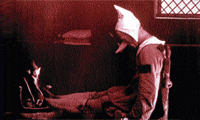Quotes of the Day

![]() Let's play movie producer. Which of these film treatments would get your green light?
Let's play movie producer. Which of these film treatments would get your green light?
No. 1: Don't Mess with Pinocchio. A little wooden boy is led astray by his own greed and naiveté. Born poor and with a bad attitude, his first act is to stick his tongue out at the world, and the price he pays is shocking: his nose grows with every lie, his feet are burned off, he is chained like a dog and even hanged. But the boy sure can dish it out: when a moralizing cricket gets in his face, boy squashes bug.
No. 2: Bravo, Pinocchio! The little wooden boy is led astray but quickly recovers, and the price he pays is small: his nose grows, but there are no burned feet. And when the cricket gets in his face, it isn't squashed; it sings Give a Little Whistle.
For 62 years — ever since Walt Disney brightened up the grimmer corners of Carlo Collodi's 1883 classic The Adventures of Pinocchio — there have been two competing versions of the little wooden guy's story: one headquartered in Italy, where people rightly regard the original as a work of dark genius; and one in the U.S., where generations raised on Disney's moody animated gem don't even know a more somber version exists. So when Italy's biggest star, Roberto Benigni, chose Pinocchio as the follow-up to his triple-Oscar global hit Life is Beautiful (1997), fans of the pinewood protagonist wondered which Pinocchio would show up on their screens.
|
But once the ballyhoo of the Italian release is over, Benigni, his wife and muse Nicoletta Braschi and Miramax co-chairman Harvey Weinstein will enter an editing suite in the U.S. to prepare a dubbed and scrubbed version of the film for the U.S., where it is due to open on Dec. 25 at 2,500 cinemas. The company admits that it is making "nips and tucks" to Pinocchio but denies trying to Americanize the film. Sources say some of the frightening imagery in the movie will be cut because the film is being pitched at American families with small children, complete with McDonald's Happy Meal tie-ins. "It's a matter of playability to U.S. audiences," says Rick Sands, Miramax chairman of worldwide distribution. "We don't believe the film is dark but we're marketing it as a family movie whereas in Italy it's being marketed as a Roberto Benigni film ... Roberto wants what's best for the people in each territory." There's some darkness to Pinocchio, he admits finally, "and the question is how to edit those scenes without impacting the integrity of the movie."
In the age of Vin Diesel, do children really need to be protected from Pinocchio? "The notion of trying to shield children from violence is pernicious," says Richard Wunderlich, co-author with Thomas J. Morrissey of the recently published cultural study, Pinocchio Goes Postmodern (Routledge; 257 pages). "In Italy the church fathers were once concerned that Pinocchio encouraged rebellion, where the current concern is that the story seems to reward obedience."
Collodi's original conception still speaks to modern souls, says co-screenwriter Vincenzo Cerami, because "he's innocent, full of life, existing in an infantile Eden, looking for what Freud called the pleasure principle. He has to accept the principle of reality that includes death and a sense of duty." But it's also the story of every man and woman, says Wunderlich, "Of growing up from a self-absorbed child wanting every desire fulfilled immediately into an adult who learns how to take care of himself and learns he has deep feelings for others."
Such eternal moral complexities have regularly lured artists and playwrights to revise and adapt Pinocchio, and a roster of cinema greats and not-so-greats have risen to the challenge, though, to Italian eyes, none has ever quite nailed him. Benigni told a preview audience two weeks ago how his friend, the late Italian director Federico Fellini, used to call him Pinochietto and urged him to do a Pinocchio. "I feel so much like Pinocchio that when I see a tree, I yell out, 'Daddy!'" he said when the project was launched. Keeping him company on his adventure is his wife and very own Blue Fairy, Braschi, co-screenwriter Cerami and soundtrack composer Nicola Piovani, all of whom worked with him on Life is Beautiful.
From the start Benigni has said he wanted to produce a literal version of Pinocchio. Italian critics exiting the preview noted that he had certainly been faithful to the text, but wondered whether his onscreen antics didn't pale beside Benigni's own adventures last week, which were classic Collodi.
Benigni used to be applauded as a scourge of the Italian establishment, but many of his fans are now starting to wonder whether the impish director isn't forgetting out of what wood he was carved. Once an arch tormentor of Prime Minister Silvio Berlusconi — who has ofttimes been satirized with a nose of Pinocchian proportions — Benigni now says that whatever his failings as a statesman, Berlusconi is "a bloody good businessman." Could this have anything to do with the fact that Berlusconi's Medusa Group is distributing Pinocchio in Italy? Then, after Benigni restricted an awards ceremony photo-opportunity to just three minutes, Italian press photographers went out of their way to scrag him for getting too uppity. In a punishment crueler even than nasal elongation, the snappers all filed a single picture for the front pages — one with Benigni's face obliterated.
By opening night, Benigni's grin was everywhere again. The film is beautiful, the music lush and memorable and the text duly honored. If Benigni ends up being hanged by the reviews, it will be for the crime of forgetting to bring enough of himself to Pinocchio. But Give a Little Whistle for this: In Italy, at least, the cricket gets squashed.
- MICHAEL BRUNTON
- Benigni's version of Pinocchio has a split personality







